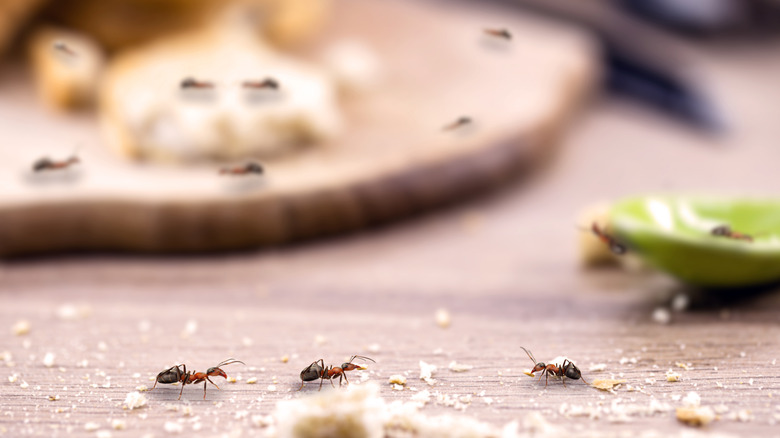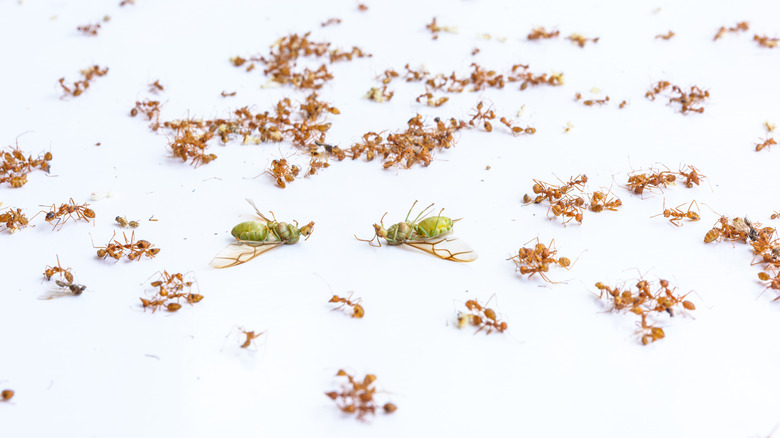Derived from the seeds of the neem tree (Azadirachta indica), neem oil boasts a rich history of applications in traditional medicine and agriculture spanning centuries. Its versatility extends from skincare remedies to pest control solutions. The active compounds within neem oil, notably azadirachtin, exhibit potent insecticidal and repellent properties, making it a compelling choice for those seeking a safe and eco-friendly alternative to conventional pesticides. And if you’re wondering whether you can solve your ant problem with neem oil, the answer is a resounding ‘yes!’
Ants have a penchant for infiltrating our homes and can quickly turn from a minor annoyance into a major headache. Driven by their insatiable quest for food and water, ants can establish formidable colonies within the cozy confines of our living spaces, prompting frustration and hygiene concerns.
While numerous methods are available for dealing with ant infestations, an increasing number of homeowners are turning to the natural prowess of neem oil as a reliable and effective solution. Here, we delve into the multi-faceted utility of neem oil and how it is harnessed to combat ant invasions, providing homeowners with an effective, sustainable, and natural way to get rid of ants.
Using neem oil to eliminate ants

Are you curious about the mechanics behind neem oil’s efficacy against ants? The key lies in its multi-faceted approach. Crafting a neem oil ant spray involves mixing a few drops of neem oil with water and a small amount of liquid soap.
Mix in 4 teaspoons of neem oil plus 2 teaspoons of liquid dish soap into a gallon of water. Mix the solution thoroughly and transfer it into a spray bottle. Spray the solution only on affected areas, including ant trails, under your dining table, and even on aphids (which ants depend on as a food source) in your garden. Spraying this concoction on ant mounds and along ant trails, entry points, and other congregation areas ensures optimum contact. The neem oil works by disrupting the hormonal system of ants. This interference hampers their ability to feed, breed, and communicate effectively, creating a formidable barrier against their persistence.
For a more targeted application, soaked cotton balls in a diluted neem oil solution can be strategically placed in areas prone to ant activity. As the ants come into contact with these neem-treated cotton balls, they unwittingly carry the oil back to their colony, inadvertently spreading the neem oil and destabilizing the ant community from within. Remember, the science behind neem oil’s effectiveness lies in its ability to disrupt ants’ hormones and, in turn, their behavior and intricate social structure, rendering them less efficient and more vulnerable to external threats.
Prevention and additional ant control tips

While using neem oil provides an effective immediate solution, a comprehensive approach to ant control includes preventive measures to discourage their return. Maintain a consistently tidy and organized living space by promptly cleaning up crumbs and spills, eliminating enticing food sources, and keeping food containers sealed securely. We also advise fixing any leaks to deny ants access, because they’ll eat their way through water-damaged wood. In tandem with neem oil, you may also consider deploying diatomaceous earth around entry points as an additional barrier. This fine powder, derived from fossilized diatoms, acts as a desiccant, absorbing the waxy layer from the ants’ exoskeleton, leading to their dehydration and demise.
Landscaping choices also play a pivotal role. Trim branches and foliage away from your home to disrupt ant highways and make it more challenging for them to access your living spaces. Creating a barrier using common household items like cinnamon or vinegar along potential entry points can act as a further deterrent. By combining the power of neem oil with these preventive measures, you not only address existing ant issues but also create an inhospitable environment, deterring future invasions and maintaining a pest-free home.



